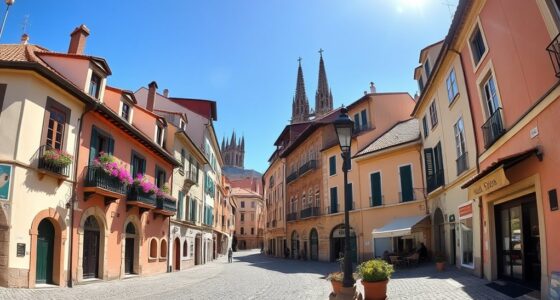Sustainable travel in Europe is experiencing remarkable growth as more travelers like you seek eco-friendly experiences and responsible destinations. You’ll find plenty of eco-certified hotels, green-certified activities, and innovative digital tools that help reduce your environmental impact. Preferences are shifting toward quieter, meaningful experiences in lesser-known spots. Policies and regional initiatives support sustainable development, making responsible travel easier and more trustworthy. Keep exploring to discover how these trends can enhance your next eco-conscious adventure.
Key Takeaways
- Growing eco-consciousness among travelers boosts demand for sustainable accommodations, eco-certified hotels, and responsible tourism practices across Europe.
- Digital tools and virtual reality enhance eco-friendly travel choices, helping travelers locate green-certified options and reduce environmental impact.
- Regional policies and certification programs like Green Key support transparency, trust, and infrastructure development for sustainable travel.
- Innovations such as electric mobility and advanced waste management at destinations promote lower-carbon travel experiences.
- Lesser-known destinations are promoted to distribute visitor flow, preserving popular sites and supporting inclusive, responsible tourism.
Rising Trends in European Sustainable Tourism
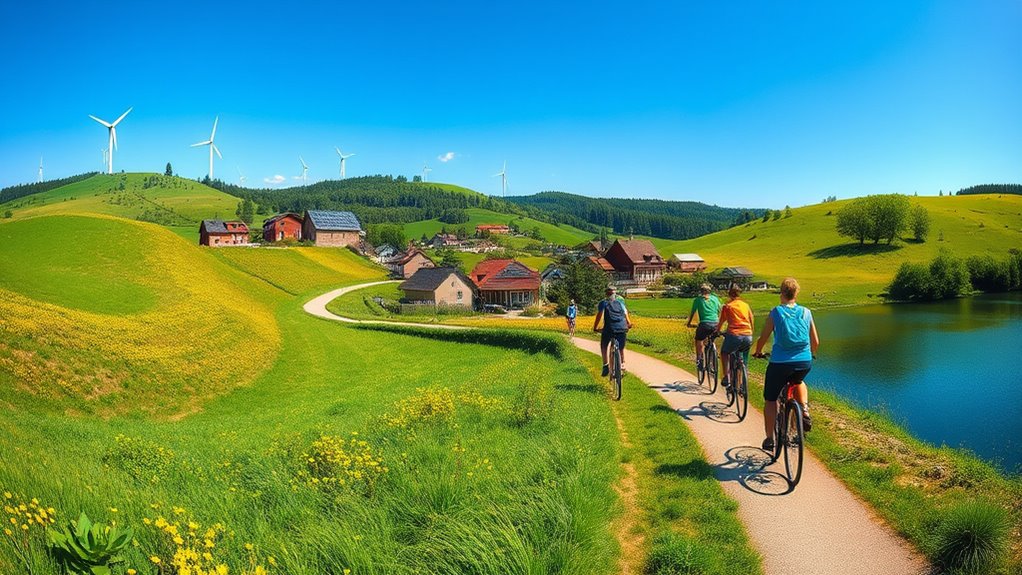
Are you noticing how sustainable tourism is shaping the future of travel in Europe? The sector is experiencing steady growth, driven by travelers’ increasing eco-consciousness. International arrivals in Europe rose by 3.3% in mid-2025 compared to 2024, with over 340 million visitors in the first half of the year. Travelers are spending more, signaling confidence in responsible tourism options. Many are seeking out lesser-known destinations to avoid overcrowding and reduce environmental impact. About 62% plan to stay in sustainable accommodations, reflecting a shift toward eco-friendly lodging. The ecotourism market is expanding rapidly, projected to reach nearly $280 billion in 2025. Overall, the industry is embracing innovation, green certifications, and policies that promote more sustainable, balanced tourism growth across Europe.
Changing Traveler Preferences and Their Impact
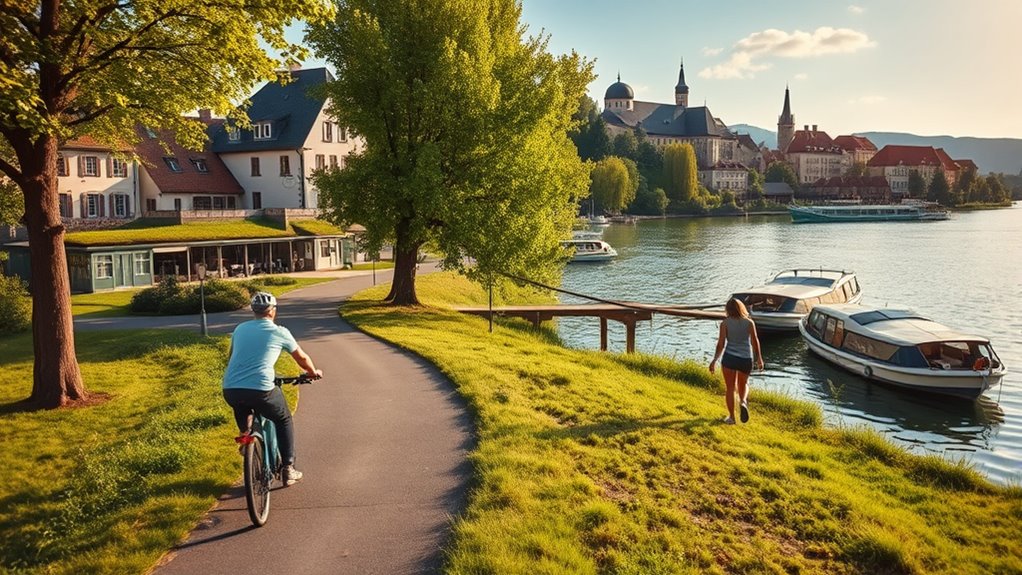
Have travelers’ preferences shifted considerably in recent years? Absolutely. You now seek quieter, more meaningful experiences, like exploring lesser-known spots or engaging in cultural and wellness activities. Your focus has moved toward value, comfort, and sustainability, even amid inflation. You prefer flexible travel options, with car travel gaining popularity over air for remote access. This shift impacts destinations, prompting them to adapt and offer authentic, eco-friendly experiences. Additionally, these changing preferences reflect a broader sustainable travel trend that encourages responsible tourism practices.
The Role of Eco-Friendly Accommodations and Ecotourism
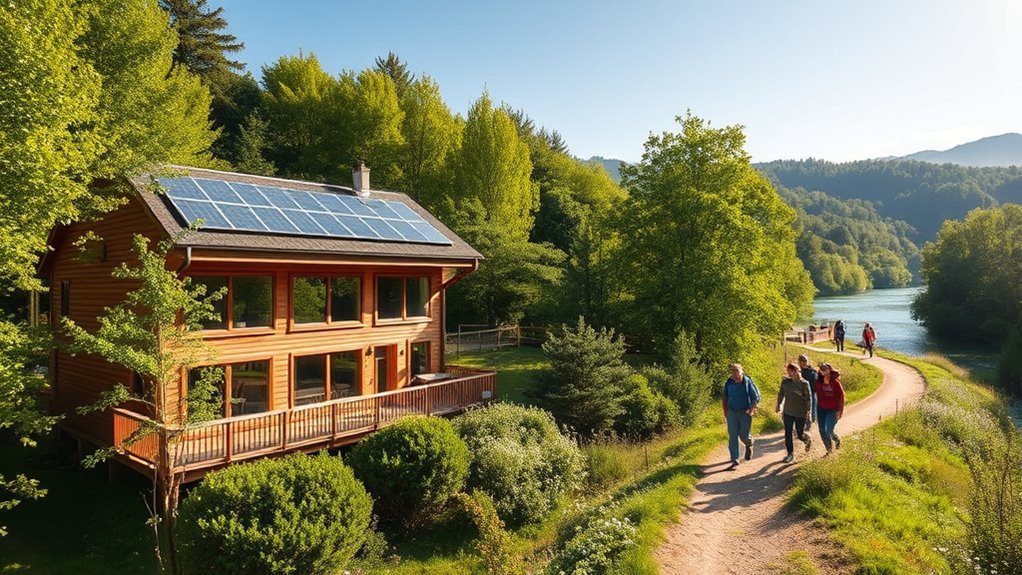
As more travelers seek eco-friendly stays, the market for sustainable accommodations is rapidly expanding across Europe. Many are overcoming barriers like lack of information and infrastructure by choosing certified options and supporting local eco-initiatives. This shift highlights how eco-tourism is becoming a key part of responsible travel, shaping the future of sustainable tourism.
Growing Eco-Conscious Stays
Eco-friendly accommodations and ecotourism are increasingly shaping the way travelers experience Europe, driven by a growing awareness of environmental impacts. You’re likely to notice more hotels and lodges earning eco-certifications like Green Key, reflecting commitments to sustainability. Many of these stays minimize energy use, reduce waste, and support local communities. You might choose eco-friendly options to lower your carbon footprint and support responsible tourism. As demand rises, destinations are integrating greener practices, making sustainable lodging more accessible. You’re also encouraged to participate in ecotourism activities that promote conservation and cultural preservation. This shift aligns with your values, ensuring your travels contribute positively to the environment and local societies. Incorporating vetted eco-accommodations can enhance the authenticity and impact of your sustainable travel experience. Embracing these stays helps shape a more sustainable future for European tourism.
Market Expansion and Trends
The market for eco-friendly accommodations and ecotourism is experiencing rapid growth as travelers increasingly seek sustainable options. You’ll notice more green-certified hotels and eco-lodges popping up across Europe, driven by traveler demand and industry commitment. This expansion reflects a shift toward responsible tourism, where your choice of stay can directly support environmental conservation and local communities. As a traveler, you now have access to a wider variety of eco-conscious options—from countryside eco-resorts to city-center green hotels—making sustainable travel more accessible. The global ecotourism market is projected to hit $279 billion in 2025, showing impressive growth. This trend encourages industry innovation, with more destinations adopting sustainable practices, and helps you travel with a lighter environmental footprint while enjoying authentic, meaningful experiences. Additionally, the rise of Eco-Friendly Hacking techniques in the industry demonstrates a commitment to safeguarding these sustainable initiatives from cyber threats.
Overcoming Sustainability Barriers
Despite growing interest in sustainable travel, many travelers still face obstacles when choosing eco-friendly accommodations and ecotourism options. To overcome these barriers, you can:
- Research certifications like Green Key or EarthCheck to identify reliable eco-friendly options.
- Advocate for better infrastructure and transparent information in lesser-known destinations.
- Support local businesses that prioritize sustainability and community involvement.
- Use technology and apps to compare the environmental impact of accommodations and activities.
- Incorporate authentic farmhouse bedroom elements that emphasize natural materials and simplicity, promoting a more sustainable and eco-conscious stay.
Environmental Sustainability and Its Influence on Travel Choices
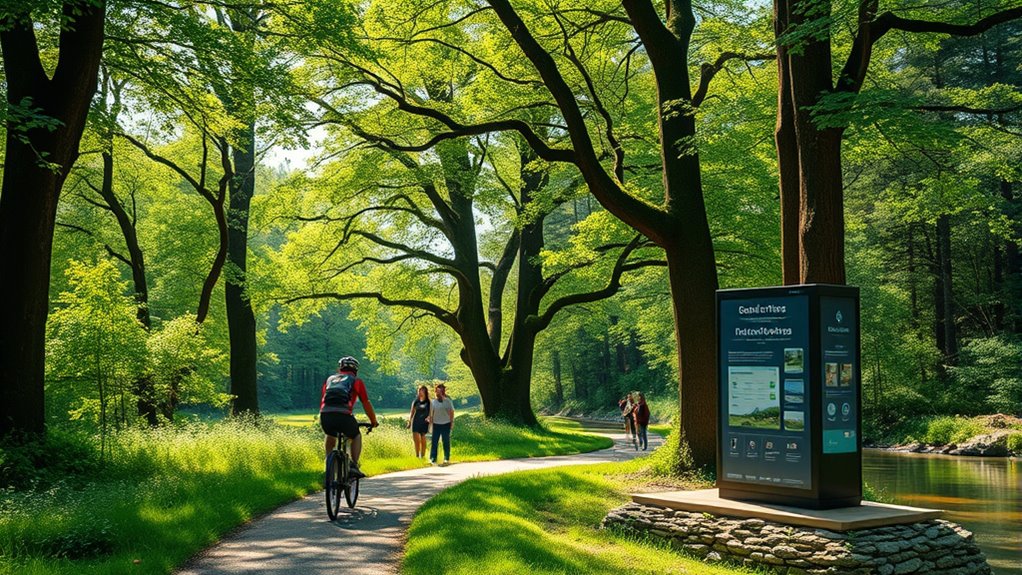
You’re likely noticing that more travelers prioritize sustainability when choosing their trips, with 84% of global travelers considering eco-friendliness important in 2025. Many are willing to pay more for green accommodations, yet barriers like limited information and infrastructure still influence decisions. Addressing these challenges can help you make more sustainable travel choices and support eco-conscious destinations. Developing a better understanding of Relationships – Personality Test can also promote more meaningful interactions with local communities, enhancing your travel experience while supporting sustainability efforts.
Eco-conscious Travel Trends
Environmental sustainability increasingly shapes how travelers make choices across Europe. You’re more likely to seek out eco-friendly options that align with your values. Here are four key eco-conscious travel trends:
- Preference for sustainable accommodations: Over 62% of travelers plan to stay in eco-certified hotels in 2025, reflecting growing demand.
- Rise of ecotourism: The global market reaches $279.41 billion, with many opting for nature-based, low-impact experiences.
- Behavioral shifts: Travelers are turning off heating or air conditioning more often, with 67% doing so in 2023.
- Willingness to pay more: Many are ready to invest in greener options, supporting sustainable hotels and responsible tourism initiatives.
- Enhanced fraud detection: The adoption of real-time monitoring systems helps ensure secure transactions for eco-conscious travelers booking sustainable experiences.
These trends demonstrate your increasing focus on environmental impact when traveling across Europe.
Green Accommodation Preferences
Have you noticed how more travelers are choosing eco-friendly accommodations when planning their trips? You’re likely seeking places that prioritize sustainability, like hotels with green certifications or eco-labels such as Green Key. These accommodations often focus on energy efficiency, waste reduction, and supporting local communities. You might prefer staying in eco-lodges or boutique hotels that minimize environmental impact while providing authentic experiences. Many travelers now see green accommodations as a way to align their values with their travel choices, even if it means paying a bit more. As awareness grows, more establishments are adopting sustainable practices, making it easier for you to travel responsibly without sacrificing comfort. The shift towards environmentally sustainable options is driven by increased awareness of AI security and its role in protecting sensitive data in digital environments, which mirrors the broader commitment among travelers to reduce their ecological footprint while exploring Europe.
Sustainability Barriers and Solutions
As more travelers seek eco-friendly accommodations, they often encounter obstacles that hinder truly sustainable choices. These barriers can limit your ability to fully embrace environmentally responsible travel.
- Lack of Information: Many destinations lack clear, accessible details about sustainable options, making it tough to identify eco-friendly accommodations.
- Insufficient Infrastructure: Limited green infrastructure, such as renewable energy sources or waste management systems, reduces the appeal of lesser-known destinations.
- Higher Costs: Sustainable options often come with premium prices, discouraging budget-conscious travelers from choosing greener alternatives.
- Limited Certification Awareness: Not all eco-labels are well-known or trusted, leading to uncertainty about the authenticity of sustainability claims.
Addressing these barriers involves improving transparency, investing in green infrastructure, making eco-friendly choices more affordable, and promoting trusted certifications.
Innovations Driving Sustainable Tourism in Europe
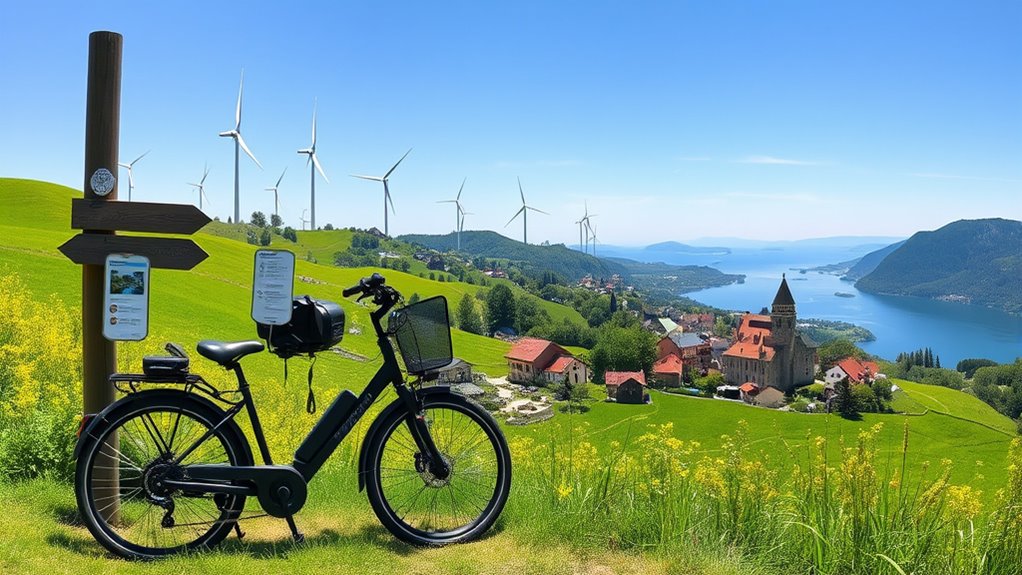
Innovations are transforming sustainable tourism across Europe, making eco-friendly travel more accessible and efficient. You can now leverage smart destination initiatives that use data analytics to optimize resource management and reduce environmental impact. Technologies like mobile apps help travelers find green-certified accommodations and eco-friendly activities, simplifying sustainable choices. Electric mobility options, including e-scooters and shared electric vehicles, promote cleaner transportation. Virtual reality experiences enable cultural exploration without physical travel, lowering carbon footprints. Additionally, innovative waste management systems at hotels and resorts minimize environmental waste. These advancements empower you to make greener decisions effortlessly, supporting local communities and preserving destinations for future generations. Embracing these innovations ensures your travel experiences are both enriching and aligned with sustainability goals. Understanding industry trends helps travelers stay informed about new eco-friendly options and best practices.
Policy Initiatives and Regional Developments Supporting Sustainability
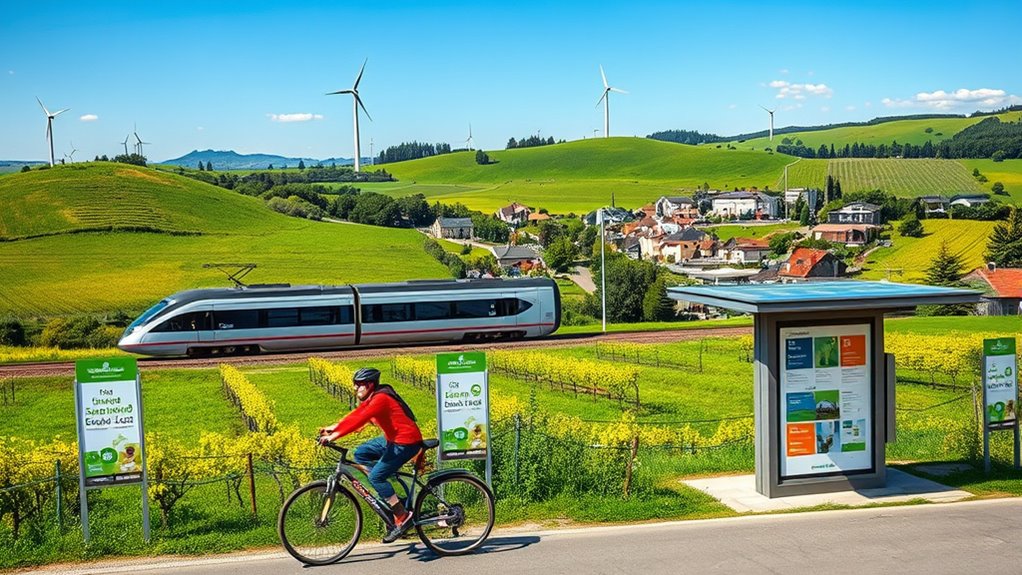
Policy initiatives and regional developments play an essential role in shaping sustainable travel across Europe by creating frameworks that encourage responsible tourism. These efforts aim to balance economic growth with environmental and social needs. A focus on dog-friendly travel is increasingly incorporated into regional policies to accommodate travelers with pets responsibly. 1. The EU’s Sustainable Tourism Partnership promotes integrating sustainability into peak season planning, ensuring responsible tourism management. 2. Support for lesser-known destinations helps distribute visitor flow, reducing pressure on popular hotspots. 3. Regional policies adapt to changing travel patterns, such as the return of Chinese visitors, emphasizing inclusive development. 4. Monitoring systems are in place to evaluate and refine policies, balancing tourism growth with environmental and community concerns.
Together, these initiatives foster resilient, eco-friendly travel practices, guiding Europe toward a more sustainable future.
Frequently Asked Questions
How Do Travelers Access Reliable Information About Sustainable Destinations in Europe?
You can access reliable information about sustainable destinations in Europe through official tourism websites, eco-label certifications like Green Key, and reputable travel platforms that highlight eco-friendly options. Look for reviews and recommendations from trusted sources, and check for sustainability credentials. Social media channels, travel blogs, and eco-tourism organizations also provide insights and updates. Always verify the credibility of sources before making your travel decisions to guarantee you’re choosing genuinely sustainable destinations.
What Incentives Are Governments Providing to Promote Eco-Friendly Travel Options?
You’ll find that European governments are offering a range of incentives to encourage eco-friendly travel. They provide tax reductions and subsidies for green accommodations, promote sustainable mobility options like trains and electric vehicles, and support local initiatives through grants. These measures aim to make sustainable choices more affordable and accessible, aligning your travel plans with environmental goals while helping you enjoy richer, greener experiences across Europe.
How Is Technology Enhancing Sustainable Tourism Experiences and Reducing Environmental Impact?
Technology enhances your sustainable tourism experience by making travel smarter and greener. You can use data analytics to find eco-friendly accommodations and routes, reducing your environmental impact. Smart destination initiatives improve resource management, like energy-saving apps or digital guides that promote local, lesser-known spots. Innovations like online booking for green hotels and real-time transportation updates help you choose eco-conscious options, making your trip enjoyable while supporting sustainability efforts.
What Are the Main Barriers to Developing Infrastructure in Lesser-Known Sustainable Destinations?
You might think building infrastructure in lesser-known destinations is a breeze, but alas, it’s often blocked by lack of information, poor regional planning, and limited funding. Local communities sometimes resist change, fearing over-tourism or losing their charm. You’ll find that regional policies and infrastructure gaps make it tough to attract investments. So, despite the desire for greener spots, progress stalls, leaving hidden gems stuck in limbo—waiting patiently for their turn to shine.
How Are Local Communities Involved in Sustainable Tourism Planning and Development?
You can get involved by engaging with local community groups and supporting initiatives that promote sustainable tourism. Participating in community-led planning guarantees local voices shape tourism development, balancing economic benefits with environmental and cultural preservation. Volunteering, choosing locally owned accommodations, and respecting local customs also help. Your active support encourages communities to prioritize sustainable practices, ensuring tourism benefits both visitors and residents while protecting the destination’s unique character.
Conclusion
As you explore Europe’s eco-friendly options, remember that sustainable travel is shaping the future of tourism. By choosing green accommodations and supporting local initiatives, you help preserve these beautiful landscapes—much like the explorers of old who charted new worlds. Your conscious choices can turn every trip into a chapter of positive change, ensuring these wonders endure for generations to come. Embrace sustainable travel now, and be part of this exciting, eco-conscious adventure.






